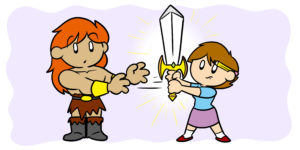What makes for a gripping sci-fi story? Aliens, super-advanced human technology, portals, time warps, war on a galactic scale? Yes, but it’s not simply the fantastic elements themselves that suck us into these fictional worlds. There’s something skillful going on in compelling sci-fi that we can learn from and assimilate (pun intended) for use in our own writing.
1. Authenticity
Building a technologically advanced future world is one of the most thrilling and complicated parts of writing a sci-fi story. It can seem like anything is possible, that the whole universe(s) is open to you, bound only by the limits of your imagination. In a sense, that’s true: you could arbitrarily make up a whole slew of cool gadgets, but is that good for your story? Is it helpful for your writing? Experience suggests that fans and writers alike are most satisfied when the fictional world, its technologies, cultural aspects, and themes reflect a believable future trajectory born of our present reality.
Fans are most satisfied when a futuristic world reflects a believable trajectory of our present.Click To TweetReaders have incredible powers to suspend their disbelief, to buy into the rules of the fictional world. But first the writer has to earn that trust; even the most outlandish idea in a sci-fi story, if given a plausible foundation, can work. That’s the key though—skillfully laying the foundation of your future world so that readers can buy into those fantastic elements of the story.
John Scalzi’s Old Man’s War is a great example of this concept. When you hear that his protagonist is a seventy-five-year-old man joining the army to fight for and defend human outposts in the galaxy, you may be tempted to roll your eyes. But the story does a great job of laying the technological groundwork: the Colonial Defense Forces have developed the ability to transfer human consciousness into a bioengineered younger version of a recruit’s body, created with their own DNA. It’s not only a unique story concept, but adds an extra dimension to the character landscape of the story—you’ve got old, wizened geezers in new, superhuman bodies. But it works because Scalzi built a solid framework.
Is your future technology a little outlandish? Does it need a stronger foundation to be plausible? How can you use character dialogue, strategically placed exposition, flashback, or writing techniques to lay the groundwork for your awesome tech innovations?
2. Complexity
If you’re looking for stories to completely transport you, sci-fi is a great place to start. The genre is known for its sweeping epics, many of which have mastered this aspect of craft: the complexity of the fictional world. Having an interesting story concept is important, yes. Constructing a unique world is important, absolutely. But if you want to create a masterful narrative that comes alive in your reader’s mind, take time to build a complex, multi-layered world that is intricately involved in the characters’ experiences and the motions of the plot. Ask yourself what historical events led to the present condition of your world. What are hallmarks of popular culture? What is the state of music, art, literature, and food culture, and do they affect your characters’ daily interactions with other people or their environment? How have advances in technology affected these aspects of culture? Considering these aspects of your world as part of your world building process will create a textured and unique setting that will hook and delight readers.
When building your world, consider its history, technology, and popular culture.Click To TweetTake Dune, for example. Frank Herbert was a master of world building. The world of Dune is immensely complex, from the ecological framework of sandworms and the precious spice melange to the entangled Atreides-Harkonnen feud to the ambitions of the Bene Gesserit sisterhood, just to name a few. Herbert takes his time exploring the culture, religion, language, and history of his fictional world, so much so that it becomes inextricable from the plot and motions of the characters.
That is complex storytelling, and it commands a captive audience.
3. Nuance
As far as genre conventions go, sci-fi and fantasy have some of the longest-standing, most well-established tropes and character types. These can be helpful to a point: when trying to outline the relationships of your characters, define your plot structure, or understand the scope of your story. But if you find that your characters, plot points, or other aspect of your narrative are clichéd or derivative, it’s time to do some more work. Tired storylines and shallow characters are a quick way to lose a reader, and they rarely make for strong writing.
So, how can you turn cliché into nuance?
Go deeper, add definition, tease out hidden possibilities. Brainstorming, journaling, interviewing your characters, there are many techniques to try; the point is to find a method that works for you and to do the hard work of giving your clichéd story elements more depth. It will pay off, I promise you.
While it was the prose that captivated me most in David Mitchell’s recent novel The Bone Clocks, the book is also a great case study for nuanced characters. There’s Holly Sykes — a mouthy and rebellious fifteen-year-old who runs away after a fight with her mom, but she has a history of psychic encounters that reappear with a vengeance when she strikes out on her own. Ed Brubeck, a classmate of Holly’s, is a loner who “doesn’t have any friends and shows no sign of wanting any”, and yet he’s the one to stop by on his bike to keep Holly company the further she wanders from home. Holly soon discovers that Brubeck isn’t a mute oaf whose dad went to prison for assault, he’s got a head full of trivia and is saving up to travel Europe.
Find the complexity of your characters and world, and bring it out. The reader will thank you.Click To TweetIt doesn’t take much to turn a cliché into a sympathetic character, and the effect is well worth the effort. What facet of your character lies just beneath the surface that, when activated, will spark a powerful turn of events? What counter-cultural thing does your character believe? What dream or desire or obsession sets him or her apart from their friends?
4. Meaning
Speculative fiction lends itself very well to exploring themes. They’re often hidden beneath the surface of the more thrilling and fantastic elements of the narrative, making their moments of revelation all the more powerful. And a story with a message is one that lingers in the minds and hearts of readers. I don’t mean to suggest you should always be writing story as parable or allegory, only that if you have something to say, don’t be shy about it.
I read Fahrenheit 451 in middle school. That was a long time ago, but to this day I have a very vivid memory of Guy Montag and his journey to preserve knowledge in a world bent on annihilating it. Ray Bradbury’s protagonist is a fireman doing his duty, observing the rules, but all the while indulging in a complex inner life that drives him to find the truth. The story is vibrant with Bradbury’s view of a future world, complete with wall screens, a robotic dog, book-burning “firemen”, and looming nuclear war. But it’s a world bursting with meaning, whose lessons are up for interpretation.
What message beats at the heart of your story’s action? Are you exploring ideas about science, religion, politics, culture that will resonate with or challenge readers?
Sci-fi novels tell some of the most thrilling tales and the scaffolding on which they’re built can give us valuable lessons about how to deepen our own writing. How has examining the aspects of authenticity, complexity, nuance, and meaning changed the way you see some of your favorite books in the genre? Which of these are you struggling with in your work-in-progress? Let me know in the comments.
For more on this subject, check out Are You Writing Believable Non-Human Characters?, Speculative Fiction World-building Techniques You Need To Know and You’re Making A Mistake In Your World Building: Here’s How To Fix It.






7 thoughts on “4 Things Every Good Sci-fi Story Needs”
Another great article, thanks Paige.
Are you still editing? What is your rate to edit a sci fi book?
Hi Karen,
Thanks for reading! I am still editing, and I love working with sci-fi projects. I’ll email you the details.
Best,
Paige
Hey, I’m looking at this for a school project with my friend and we’re confused. Not on a certain section, just on everything in general. We’re writing a sci-fi, fantasy, horror story. How could we make it a horror story and make it sci-fi? Other than this, we think that this is the best article that we’ve looked at, and we’ve looked at a TON! Thanks.
Dear Summer & Ebony,
Thanks for your note. I’m so glad you found this article helpful! Great question about how to write in multiple genres at a time. Both sci-fi and horror are genres with a lot of diversity, so there is a lot of overlap that allows you to write with elements of both genres at one time. As a starting point, check out this list of Sci-fi Horror books (https://www.goodreads.com/shelf/show/sci-fi-horror). Another thing to try is making a list of common elements to each genre and then see what elements might fit well together in one story. For example, you could write about zombie-like creatures discovered by a team of scientists investigating a new planet. Or what about a government of the future developing a secret biological weapon that gets out of hand and creates a worldwide pandemic? These are just two examples that contain elements of both sci-fi and horror, but the options are endless. Does this help? Best of luck to you both on your project!
Paige
This was really helpful!!!! Thank you so much. it has earned me an A in my English class!!!
Ruth,
Thank you for commenting! I’m so happy to hear the article helped you. Keep up the good work!
Paige